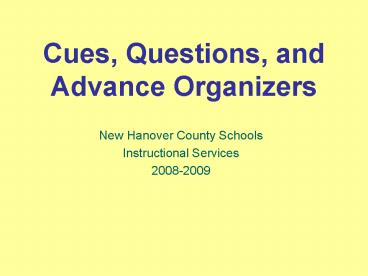Cues, Questions, and Advance Organizers - PowerPoint PPT Presentation
1 / 11
Title:
Cues, Questions, and Advance Organizers
Description:
Compare and contrast Cinderella to one of her stepsisters. ... are the characteristics that make Cinderella's stepsisters so undesirable to the ... – PowerPoint PPT presentation
Number of Views:422
Avg rating:3.0/5.0
Title: Cues, Questions, and Advance Organizers
1
Cues, Questions, and Advance Organizers
- New Hanover County Schools
- Instructional Services
- 2008-2009
2
- Cues, questions, and advance organizers are
techniques used to help students activate prior
knowledge and deepen understanding of current
learning.
"Cueing and questioning are at the heart of
classroom practice."
(Marzano 113)
3
- Cueing and questioning might account for as
much as 80 percent of what occurs in a given
classroom on a given day. - Davis, O.L., Tinsley, 1967 Fillippone, 1998.
4
Generalizations in using cues and questions
- Waiting briefly before accepting responses from
students has the effect of increasing the depth
of students answers. - Higher level questions produce deeper learning
than lower level questions. - Cues and questions should focus on what is
important as opposed to what is unusual. - Questions are effective learning tools even when
asked before a learning experience.
5
Types of Advance Organizers
- Expository
- Narrative
- Skimming
- Graphic Organizers
6
Levels of Thinking and Reasoning
(Adapted from Marzano, et al, 1988)
- Evaluating
- Integrating
- Generating
- Analyzing
- Applying
- Organizing
- Knowledge
Usually higher order thinking skills
Usually lower order thinking skills
7
Revised Blooms Taxonomy
8
Research to Application
Higher-level questions tend to produce deeper
levels of learning. (Marzano 114)
9
Levels of Questions
- In the Disney version of Cinderella, what are
the names of Cinderellas stepsisters? - Compare and contrast Cinderella to one of her
stepsisters. - What are the characteristics that make
Cinderellas stepsisters so undesirable to the
prince?
10
Moving to Higher Levels of Questioning
- With your group, read through the question
cards. - Choose two questions.
- Write a higher-level questionfor each of the
questions your group selected.
11
- Helping students think about new knowledge
before experiencing it can go a long way toward
enhancing student achievement. (Marzano 120)































